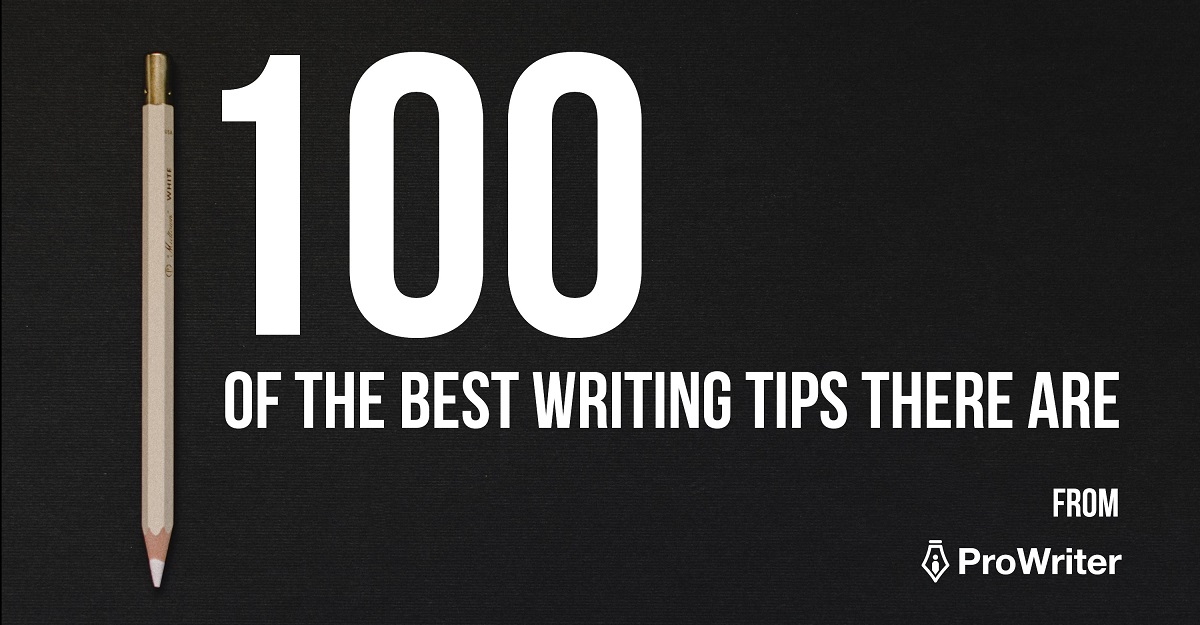We skipped all the generic, cheesy writing tips that don’t actually help anyone.
These are real, practical tips for writing and career you can actually use, designed for hard-working, salt-of-the-earth professionals making a living as freelance writers.
There are plenty of articles online that offer writing tips, but if you ask me, most of them are pretty vague.
“Write every day!” or “make sure your writing serves the reader!” are fine tips, but they’re a little too broad and generic to really be useful to a professional writer.
We’re talking to a different group of writers out there — writers who write for a living, and who want to figure out how to be even more competitive in an already-saturated freelance writing market.
If you’re still reading, I’m guessing you’re in that group. You’re looking for writing advice that will actually help you improve your craft, your career, and at the end of the day, your ability to make money, right?

Well good, you’re in the right place then.
Sure, if you need help writing your novel or screenplay, you mostly just need to sit down and do it.
But if you’re a freelance writer by trade or are exploring freelance writing as a career option, we wanted to offer some advice that will help you focus on what matters and how to become the best freelance writer you can be.
ProWriter’s staff have worked both as freelance writers and with freelance writers for many years, and in that time we’ve learned a lot about what people who hire writers are looking for and what skills make writers more likely to get great gigs.
With that in mind, here are 100 of the best pieces of writing advice we could come up with. They cover:
- Skills you need to focus on developing right away
- Early strategic moves that’ll help you in the long run
- Real talk about finding (and keeping) better gigs
Let’s get to it. And if you think we can or should go deeper on any of these points, shoot me a note on LinkedIn. We want to be as specific and helpful as possible for writers trying to earn a living every day!
100 tips for professional writing
1. Get your name on your work
Start building a portfolio of bylined work on Day 1. You might need to ghostwrite to pay the bills at first, but the only way out of that is to build trust with clients (and Google) by putting your name on great content.
2. Plan for periods of low workload
The most successful freelance writers we know understand that the market can swing wildly. Diversify your craft, build up your emergency fund, and invest in good professional relationships to weather the valleys.
3. Widen your perspective
This is the point in most advice lists where you’re told to travel and have experiences. But what we mean here is to look outside of the freelance community when it comes to improving your skills. Don’t just hang out in freelance Facebook groups or read blog posts at sites for writers (yes, this includes ProWriter). Subscribe to SEO blogs, marketing podcasts, and widen your media diet so you can keep tabs on what’s hot in the zeitgeist and what’s working in digital, social, and search. All of that has a direct impact on your efficacy as a writer and your value to your clients.
4. Invest in your own professional development
You don’t have a boss to hand you a plane ticket to some conference or workshop. You are ultimately responsible for making sure your skills are bleeding edge. Constantly be on a proactive lookout for YouTube videos, free webinars, and articles on hard SEO skills, how to write engaging titles, emotional triggers, and whatever else will keep you competitive in your vertical.
5. Develop complementary skills and market them
For example, spend a few Saturdays taking graphic design courses at sites like Udemy so you can create custom images or infographics to help with social promotion. Learn WordPress so you can set up websites quickly. Anything you can do to position yourself as the all-in-one solution for your clients will not only help you get more jobs, it’ll also put you in a stronger position to negotiate for higher rates.
6. Incorporate
Become an LLC and market yourself as a business (even if you are a business of just yourself). Writers that act like like real professionals are treated like real professionals!
7. Diversify your client base
Building a book of business of direct relationships with good-paying, recurring clients takes time. Pitch your services to digital publications, marketing agencies, and others while you build your dedicated client base.
8. Take low or unpaid work if you must, but…
Make sure you get something out of it that helps you. Most writers need to take less-than-ideal work starting out, but try to negotiate for something that gives you a strategic advantage down the line, like a byline.
9. Think ‘content’ everywhere you go
Practice self-awareness. Maybe there’s a new hobby you’ve picked up, a funny or heterodox opinion you have about something, or a new trend you find interesting. If you’re interested in something, you’re almost certainly not alone. But you might be the first (or best-suited) to write about it. These random thoughts of yours could be opportunities for pitches or potential gigs.
10. Never market yourself as ‘willing to learn’
While it’s good to have this attitude in general, it comes off as a red flag for employers. Most of your clients don’t have time to mentor you. In an ideal world, every client would at least give you constructive feedback at the end of a gig, but we don’t always live in that world. Focus on what you can do and deliver.
11. Build a portfolio early
You need to create a professional portfolio right way and put the work you’re proudest of in it. A portfolio is a billboard for what you can do. If you can’t build your own website, you can use an online writing portfolio (like the one we built at ProWriter). And please, for the love of all that is holy, do not use Google Drive or Microsoft Word. It doesn’t look professional.
12. Maintain your portfolio
I know a lot of good writers who haven’t updated their websites, portfolios, or LinkedIn profiles in years. Make a habit of keeping up your portfolio whenever you finish a job. Clear out old clips that don’t represent your abilities anymore, and add new work you’re proud of. You never know who’s looking at your page.
13. When pitching, get to the point
You ever have a friend who tried telling you a story, but keeps backing up to establish context? Boring, right? Editors are busy people. All they need to make a decision is what your unique angle is, and then, efficiently as possible, why you’re the one to write it.
14. Include success stories
If a client gives you a compliment on your work, ask for a review. If a job you did created some kind of tangible success for a client, ask for details. Include this in your portfolio or your outreach to new clients if it makes sense. It’s proof of concept that you can deliver. Don’t just say you have a track record of success. Show it.
15. Nail the first draft
This is about getting as much information out of your client as possible before you write. Agree the expectations, the goals of the gig, and what kind of messaging needs to be reflected early on. That way if they push back, you can point to exactly what you did to fulfill what you both agreed to.
16. Ask about recurring opportunities
Don’t feel awkward or uncomfortable about asking an employer for more work after you’ve completed a job. The worst they can say is “no” and if you did a good job, they’ll keep you in mind for the next gig.
17. Be transparent about deadlines — and keep them
It’s tempting to promise a new client the moon, but you don’t want to set yourself up for failure. Early on, try to under-promise and over-deliver on deadlines until you get a good sense of how long it takes you to do something. Then you can give more accurate estimates to clients.
18. Take breaks
Writing is a sit-heavy job with long hours. Sitting is the new smoking. Don’t forget to get up and walk around every hour or so.
19. Create boundaries
We don’t mean with clients (though those are important too). If you’re working from home, you need to create boundaries to protect yourself from … yourself. Set up an office space away from your distractions.
20. Wear pants
I hear you, a “flexible” dress code is part of the work-from-home appeal. But try dressing up like you’re going to the office one morning and see if it makes a dent in your productivity.
21. Keep an eye on where there are needs and fill them
Let’s say you have 3 clients in a row that ask if you can do email marketing copy. Take the time to try and learn that new skill. It might not be a one-off need — it might be a trend you can get in front of.
22. Turn social signals into content
Let’s say you and your friends are out drinking and all of you get fired up and enthusiastic debating a particular topic. That might be a pitch. Let’s say you had a quick take on Twitter that generated more engagement for you than usual. There you go, another pitch.
23. Make sure you have your own projects
This will sound corny, but you do need a “you” project. Even if it’s a personal blog. In the same way financial planners tell you to set aside a certain amount of money for savings and treat it like a bill every month, do the same with your schedule and set aside time for the “you” project.
24. Let people see your face
This is a subtle psychological thing, but trust us on this. When clients can see that you’re a real, normal human, it will help you establish trustt. I’d go so far as to say ‘find opportunities to SHOW OFF your face.’ Ask for a Hangouts chat instead of a phone interview. Anything you can do to establish a human connection will help.
25. Start a newsletter
This could be your “you” project, and yes, you will only have a dozen subscribers, two of which are your mom’s work and personal emails, for a long time. But keep at it. Find an angle. Write like you have a list of 10,000.
26. When you’re discouraged, remind yourself that writers will always be needed
This is not a job robots are replacing anytime soon. As long as there are humans looking to relate to one another, buy things from each other, and find ways to explain how they feel, writers will have opportunities.
27. Take other jobs if you have to
Again, sometimes this market ebbs, especially if you’re early on in your career. Don’t take it as a sign of your failure. Do what you must to make sure bills are paid, but look for your angle back in. It’s only over when you stop investing in it.
28. Set expectations with clients
The number one way client relationships spin out of control for new writers is over revision requests. Like #15, have your client define for you what a successful final piece of copy looks like, and agree in advance to the number of revisions you’ll allow. On that note…
29. Use contracts
Sure, you’re probably not a lawyer, and you probably don’t have $1,200 lying around to hire one to write you a contract. But do the research, ask other freelancers, do what you have to in order to get a template contract right away, and use it for every job. It’s the best way to define expectations and protect yourself from potentially crappy clients.
30. Invest in people
When you find clients you enjoy working for, try to establish more personal relationships with them over time. This is a people business, so invest in people.
31. If things are slow, keep submitting
The same way you don’t want gaps in your employment history, you don’t want big gaps in your writing output, and not just for professional reasons. You need to write to keep your muscles strong, so when things are slow, it might be a good time to find sites you can submit content to and write a few columns, op-eds, or articles about your passions and interests.
32. Move on quickly
“Never give up” is good advice for your writing on the whole, but some young writers take this to mean that they need to keep following up with potential employers until they get a firm answer. This kind of approach doesn’t work in dating, and it doesn’t work in business. Do one follow-up and then cut the cord.
33. Apply/pitch every day
Most full-time writers I’ve worked with say that they continue to apply for new gigs and pitch outlets they want to write for every day. Work out a routine where you do just that. Check job boards frequently first thing in the morning, and come up with angles to pitch outlets you want to work for.
34. Become more reliable than in-house talent
Many marketing and PR agencies will hire freelance writers to help them manage their projects. I’ve seen this relationship from both sides, and trust me when I say the agencies get “hooked” on good, reliable writers. If you’re one, they will turn to you for their press releases, blog posts, and more, even for the convenience of getting it off their plates.
35. Never welch on a deadline
If freelance writing was a religion, welching on a deadline would be the sin that can get you excommunicated. Always deliver. If you can’t make a deadline, say so upfront. If you need more time, give a few days’ notice.
36. Don’t copy/paste your cover letters
For freelancers, a cover letter doesn’t need to be a formal, 500-word document. Employers hardly have the time to read through hundreds of these for each job they post. A simple email cover letter is enough, and just a few sentences explaining why you’re right for the gig. So don’t copy/paste a form letter for every job. We can tell.
37. NEVER plagiarize
You’d think this doesn’t need to be said, but I’ve let go of a surprising number of writers for plagiarism. Freelance writers are busy, and shortcuts can be tempting. But with the number of tools employers use to scan billions of pages on the web for plagiarism, you will get caught and your career could end up (and honestly, should end up) in jeopardy.
38. Keep finding new niches
You might be really good at one niche, but new niches are popping up all the time, and your own personal interests change as you mature. Don’t settle. As you explore new hobbies and interests in your personal life, think about exploring them as niches in your career as well.
39. Use your real name
I can’t tell you how many writers I’ve worked with attempt to use pseudonyms, but sometimes it feels like up to half. Unless you’re in witness protection, use your real name. Like #24, employers want to know they’re hiring a real person. On that note…
40. Be easy to find and vet
I’ve had writers with zero digital footprint (and asking to be paid in cryptocurrency) apply to jobs I’ve posted. These applications go straight into the trash. Most people live increasingly online lives, so if you’re not easy to find when an employer Googles your name + writer, that’s going to send up a red flag. If you don’t have a lot of bylined work yet, an online writing portfolio, website, active LinkedIn, and maybe an Instagram that all clearly belong to the same person are the bare minimum!
41. Find people you trust to critique your work
Sure, this isn’t always doable on a deadline, but for content you really consider to be representative of your voice, have a trusted (and ruthless) professional connection (like an editor) who can pick the whole thing apart. This will make you a better writer.
42. Develop mindfulness
I’m not talking about meditative practice. Mindfulness in the context of your career means paying attention to what works. You consume content for your own purposes all the time — education, entertainment, you name it. Try to reverse-engineer what you’re seeing. What about the headline made you click? What about the article kept you reading? Did you start getting bored at any point? Did you click away before you were finished? Why? What would have kept you going? What would you have done differently?
43. Set manageable goals
If you’re like me, you wake up most mornings feeling like you’re either going to take over the world, or that you need to talk yourself into getting out of bed. Both cases turn out to be bad predictors of my overall productivity. I either overestimate what I can do when I’m feeling good, or underestimate when I’m feeling lazy or unmotivated. Set manageable goals for yourself. If you get through you list and have some extra giddyup, keep going!
44. Don’t just schedule it, segment it
We’ve already made a few points about making sure to have passion projects on the side. This point is about figuring out which times of day better suit each kind of writing you do. If you work all day and try to leave a few hours at night for creativity, but find that you feel more creative in the morning than at night, then switch it up! Spend a few hours on passion projects during the day and clean up any day-job responsibilities in the evening.
45. Whatever you want to write, there’s a structure for it
A lot of young writers think that they can just sit down with a blank page and follow their thoughts wherever they go. That might be a good exercise for teasing out interesting ideas, but the result is rarely publishable. Every kind of writing you want to do, from clickbait listicles to the great American novel, has a format. Learn it.
46. Develop business skills
Being a good writer isn’t enough. You’re going to need to develop some business management skills, some marketing skills, some accounting, even some interpersonal soft skills. That last point might be the most important of all. You might not physically see people you work with often (or at all), but like we’ve said before, writing is still a people business.
47. Don’t show your mom your work
What I mean is, don’t go to your mom, or your friends, or a spouse, for feedback. They’re going to love it no matter what, and even if they do have notes, you’re probably not going to take them anyway. Ask mom and co. for shares when it’s done, not feedback during the process.
48. Treat every relationship as a win/win
Let’s say you’re given a regular byline by a publisher. Not only is this a huge opportunity for you to shine, it’s also an opportunity to return value to the publisher and make them and their brand look good. This is a mutually beneficial relationship. Be mindful of this always. If your jobs aren’t mutually beneficial, quit.
49. Find the heterodox take
A lot of writers struggle with originality. “What can I say that hasn’t already been said?” If that’s you, see if there’s an opportunity to go against the grain. Is the status quo wrong, or outdated? Can you make a persuasive case that the dominant opinion on a topic is misguided, or missing critical information? Can you get 1,000+ words out of it?
50. DON’T FALL for ‘get rich quick’ promises
There are a lot of resources out there that purport to help freelance writers launch their careers with promises of six-figure incomes and houses on the beach. Take these with a bucket of salt. It is possible to become an elite freelance writer that makes that much money and works to the sound of the ocean in the background, but there are no fast solutions. Success in this field is like success in the gym. It takes time, patience, and discipline.
Hey, look at you! You made it halfway!

You’re doing great. Now might be a good time to get up and walk around, grab a drink of water, use the bathroom, whatever.
And yes, we really do have 50 more pieces of advice to give you. Buckle up!

51. Make friends with editors
We alluded to this in #41, but let’s spend a little more time on the point. Think about how much you can get out of a professional relationship with an editor. Not only can they help you improve as a writer, they can give you insights into what editors look for in a pitch, a reliable long-term freelancer, and more. Seek these connections out!
52. Improve your craft, but with purpose
A lot of writers think they get better by just practicing. Practice is important, but don’t forget to seek out and learn new skills, as well. Keep an eye out for blog posts, courses, and podcasts that go deep on hard skills.
53. Tell the truth
If you don’t believe it, don’t write it. If you do believe it, make sure you can back it up. On that note…
54. Make sure you know how facts work
A fact is information that can be verified by more than one qualified source. If information is alleged or unconfirmed, disclaim it as such or avoid it altogether. On THAT note…
55. Learn where facts come from
Figure out where good, reliable information comes from, and how to attribute it. While this arguably most important in journalistic writing, good research skills matter in more forms of writing than you think!
56. Say ‘yes’
Billionaire entrepreneur Richard Branson once said, “If somebody offers you an amazing opportunity but you are not sure you can do it, say ‘yes,’ then learn how to do it later.” Same goes for writing! Just make sure you deliver in the end.
57. Don’t forget to have something to say
Writing is about more than stringing pretty words together. Every piece of copy, from a tweet to a novel has a purpose, a goal, and a message. Make sure you have a clear idea of what it is going in.
58. Keep things simple
Figure out one point you want to make. Or three. Build your content around that. Otherwise you might ramble.
59. Write short sentences
It helps readability (and SEO for web).
60. Eliminate adverbs
Yes, adverbs are words too, and they can add flavor to your copy. “Eliminate adverbs” may sound like pretentious novelist advice, but give it a try. You’d be surprised how often you don’t need them, and how using fewer of them makes them more effective.
61. Write extra on your first pass so you have plenty to cut
Believe me, you will.
62. Network
Writers may be fiercely competitive for gigs, but they’re reliable for shares!
63. Think about how it’ll age
Don’t write anything that might come back to haunt you later. (Later? Trying to come up with 100 writer tips is haunting me now). This doesn’t just apply to writing hot takes on controversial topics. It also applies to phoning it in and submitting bad copy!
64. Take a persuasive writing course
What you’ll learn, even in a basic 101 course, will apply to almost every form of writing from ad copy to an op-ed for a major magazine. And…
65. Become a student of psychology
How people think and what they respond to is critical to good writing. If you’re going to “read more” to become a better writer, throw in some nonfiction as well. (If I can make a couple of recommendations, Thinking Fast and Slow, by Daniel Kahneman and Contagious: Why Things Catch On by Jonah Berger are good places to start).
66. Don’t write anything you wouldn’t enjoy reading yourself
The jobs that pay don’t always overlap with our passions, but take pride in your work regardless. Offer something in everything you write that you think is missing, or you would enjoy discovering as a reader.
67. ‘And’ is a great place to start a new sentence
Working on that “shorter sentences” tip from #59? A little stuck? Look at those long sentences. Did you say “and” anywhere? Try cutting your sentence in half right there.
68. Assume people will read your work
They will! And, equally as important…
69. Don’t read the comments
Ignore unhappy people blowing smoke on Twitter, in comments, or in reviews. If you feel confident in your work and know you did a great job, there’s no reason to rain on that parade.
70. Get rid of distractions
Don’t work with Netflix on in the background. It doesn’t work. Tune out your distractions so you can work faster and better. Then you’ll have plenty more Netflix time later.
71. Don’t reward yourself if you didn’t accomplish anything
We’ve all tried sitting down to write only to waste our time on something else instead. We move on, feeling a little guilty, but reassure ourselves it’s “part of the process.” Well, cut it out. Reward yourself for completing something, not almost starting.
72. Don’t announce ‘plans,’ announce ‘dates’
Research shows that publically announcing your goals makes you less likely to accomplish them. I know, I know, you think that putting yourself out there will create accountability. But the opposite is true. You get just enough of an endorphin kick from your friends cheering you on that you feel accomplished enough to do … absolutely nothing. Instead, do the work and announce the release date. Then it’s already done and you deserve that cheering.
73. Get a hobby
This is technically not writing advice, but your writing will benefit from it. Don’t make writing your life. Find something else to do that you can enjoy. Engage the other parts of your brain and body. And hey, if you get really good at that thing, maybe it can become a new niche for your writing as well.
74. Write for ‘scanning’
Short sentences? Check. Short paragraphs? I know it feels weird to have some paragraphs that are a sentence or less, but varying your paragraph size helps with readability, the all-important SEO metric. Try it.
75. Offer to do guest posts
Find blogs or other sites that cover topics you know like the back of your hand. I mean topics you know so well you take them for granted. Topics you don’t even think of as niches yet. But they are, so use that to build your portfolio.
76. Treat every opportunity like an American Idol audition
It’s tough, I know. Some opportunities don’t feel like they’d go anywhere, and others are just for some quick cash. But you never know which employers need more work at higher levels, with more regularity, and for more money, so always aim to impress.
77. Water down your vocabulary
You’ve probably heard that writers need to build a big vocabulary. Maybe for your novel, but keep it between a 5th and 10th-grade reading level for everyone else.
78. Outline
Yes, I know, you feel like you have the topic down pat. Or, you can research whatever you need on the fly and it’ll just be much faster that way. But trust me, taking the time to sit down and outline your main points, pull in the research you need to support each, and fill it in from there is the more efficient way, and it results in better copy. Going rogue without an outline just increases your chances of getting stuck or turning in mediocre copy with too much bloat.
79. Learn your hooks
A lot of writers starting out think that the lift is in the body of whatever they’re writing, and often give barely a thought to the intro or those transitions that keep readers going throughout the copy. But hooking the reader and keeping them engaged is critical to successful copy of any kind. Spend more time studying what works there than anything else, because if you can’t get a reader invested, they’re not sticking around for the hard work you put into the rest of the piece.
80. Learn the art of the title
No matter what you’re writing, the title needs that perfect balance of relevance, emotional trigger, and creativity. The title is the reader’s first impression of your work, so take the time to learn the craft and apply it with purpose.
81. Find tools
Grammarly, CoSchedule Headline Analyzer, Yoast SEO, and many more. Find and use whatever tools you can get your hands on to help you improve your writing.
82. Ask for shares
You’re never too good to ask people to share your work. I know it feels awkward, but anyone you ask can always say “no,” so you might as well make the attempt!
83. Keep writing and editing separate
Some jobs require you to edit on the fly, I get it. But whenever you can, give yourself some breathing room between the writing and the editing. You’ll be surprised how often what sounded like a good idea at the writing stage doesn’t hold up after you’ve slept on it.
84. Every word adds value
Some jobs come with arbitrary word counts. For others, writing a few more pages or paragraphs feels like the right thing to do. But don’t let length corner you into providing low-value content. Filler. Fluff. You know what it is. You’re a word person. You know how to squeeze a few more words out of a sentence. But it’s a bad habit to get into. Make sure every word adds value.
85. Learn from the mistakes of other writers
We’ve all read something that seemed to fall a little flat or feel a little awkward (not this blog post though, right? RIGHT??). Take a mental note. What didn’t work? How would you make that point better?
86. Ask for examples
Whenever you take a new job, ask your clients for previous examples of copy they felt was particularly successful for them or representative of who they are. What they give you speaks volumes about what they want to see. Reverse-engineer it and then do better.
87. WWWWWH
No matter what you’re writing, there’s a “who, what, when, where, why, and a how. Take the time to figure out the answers to these questions when you’re outlining.
88. Don’t ask for feedback
Not from your employer, anyway. Most of them don’t have the skillset, the vocabulary, and especially the time to help you figure out what you need to work on. Develop a network of peers to help you with that.
89. Always ask for another job
If it was a one-time gig or the employer just says “no,” then cut your losses and moe on quickly.
90. Watch for redundancy
We use the same words, the same turns of phrase, and the same metaphors all the time. Double-check your work.
91. Don’t put yourself in this situation
The one where you have no choice but to rush, or turn in subpar work. Maybe you’d never done a particular kind of job before and didn’t know how long it would actually take you. Maybe it’s good old-fashioned procrastination. Either way, don’t let it happen.
92. Compliment good craft
When you see other writers do something well, take some time to compliment them on it. Nobody notices those little craft quirks but other writers. Let’s lift each other up!
93. Don’t turn in copy with a single error
‘Nuff said.
94. Pay it forward
Writers are competitive, but there are ways we can help each other out. If you’ve outgrown a gig or are in a situation where you’re offered a good opportunity that’s below your pay grade, pass it along to someone earlier in their career who can handle it.
95. Read it out loud
If it doesn’t sound right to you, it won’t read right, either.
96. Aggregate experts, not ideas
A lot of writing requires research. But don’t just look around for generic ideas to put into your article. Find the experts, and quote them by name. Add your own questions and insights (or those of your client) on top of it.
97. Remember…
You want to tell your reader what to do with the information you’re giving them, no matter what you’re writing. Have a clear idea of what that is, and explicitly say it. Don’t leave it to their imaginations.
98. Formatting hacks
A lot of these tips are about readability and keeping readers hooked. If you can’t tell by now, the format itself plays a huge role in that. Where to place headings, how to tease with hooks and transitions, short sentences and paragraphs — learn how to upgrade your copy with formatting tricks.
99. Be competitive!
Be the best damn writer and write the best damn content you can.
And finally…

100. Kill passive voice FOREVER.
Yes, this is the most important tip. Passive voice is one of the top giveaways of an immature writer. Destroy it with impunity. This blog post is 5,000 words long, and you better believe I went through it after my first draft and eliminated as much passive voice as humanly possible.
You made it! Thanks for sticking with us to the end.
I hope you found these tips useful. If so, please share this article, or the tip you found most useful, with your network. Once again, find me on LinkedIn if you have questions or want to keep the conversation going.






